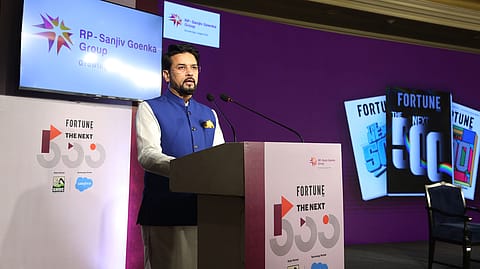Fortune India TheNext500: India on path to become 'Atma Nirbhar' in real sense, says Anurag Thakur
Fortune India's The Next 500 event witnessed three-panel discussions.

India is on the path to becoming 'Atma Nirbhar' in the real sense and companies in the Fortune Next 500 are helping us to become truly self-reliant, according to Union minister Anurag Thakur.
India continues to leapfrog ahead as the global economy is under the cloud of recession, Thakur says at Fortune India's The Next 500 event.
The event witnessed three-panel discussions. Industry leaders shared their ideas and insights on what it takes to make it into "The Big League" of companies in India, their expansion plans, and the territories they are eyeing to tap into.
Aseem Joshi, CEO of India Business at GMM Pfaudler, talked about factors that play a role in chemical and pharma sectors, saying the company is dependent on the CAPEX cycle of its customers. "So a big part of being successful in this space is to know the pulse of the industry and figure out when you need to invest in capacity building and when you really need to hunker down and be more focussed on the margin and cost side of things."
In an investor-investee tango session, Aman Gupta, founder and CMO of boAt Lifestyle, says homegrown the audio-tech brand is building blocks to become a made-in-India global lifestyle brand and plans to go all out next year. On the global expansion plan, Gupta says this year the company will focus on India and going all out is next year's vision. Going ahead, the company will try and test smaller global markets such as Bangladesh and the UAE, he says.
"We don't want to be in a situation where we start 100 countries and close in 99 countries. You hire 2,000 people and fire 1,500. We want to do it easily at our own pace as we are heavily capitalised and we don't need crazy capital. Our demand in India is more than supply," Gupta says.
In another such session, Mamaearth co-founder Varun Alagh says almost all multinationals were importing for India rather than crafting for India. "Indian tropical weather did not require heavy creams. We need light hydration. If we have to build for India, we have to build for the Indian consumers," Alagh says.
Recommended Stories
"We just kept focused on consumers and that became our DNA. When we are listening to consumers... they said we would like to buy products for ourselves and that's how we expanded into categories like adult care," Alagh adds. "Early on when we used to meet a lot of investors, they used to scare us by telling us that it is a very competitive market and there are so many large players. How can you beat them?"